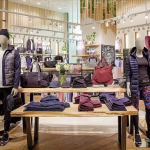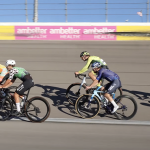Reebok International Ltd. reported net income for the second quarter was $26 million, or $.41 per diluted share, as compared to net income of $25 million, or $.39 per diluted share in the second quarter of 2002, an earnings per share increase of 5%. The second quarter 2002 results contain a one-time earnings benefit of $.07 per share from the favorable resolution of certain outstanding prior years' international Customs issues. Excluding the 2002 effect of this one-time favorable settlement, 2003 earnings per share increased 28%.
Net sales for the 2003 second quarter were $803 million, an increase of 12% from 2002 sales of $717 million. Foreign currency exchange rate fluctuations favorably impacted sales comparisons. On a constant dollar basis, second quarter sales increased approximately 7% over the prior year's second quarter sales. For the Reebok Brand, worldwide sales in the 2003 second quarter increased 15% to $671 million.
In the U.S., sales for the Reebok Brand increased 14% in the second quarter of 2003 as compared with 2002's second quarter. Reebok's U.S. footwear sales in the second quarter of 2003 were $272 million, an increase of 9% when compared with 2002's second quarter U.S. footwear sales of $249 million. The Company's international sales of Reebok branded products amounted to $290 million in the quarter, an increase of 16% over 2002's second quarter sales.
Sales for the Company's Rockport subsidiary were $88 million in the second quarter of 2003 compared with 2002's second quarter sales of $95 million. Sales for the Company's other brands; Ralph Lauren Footwear and The Greg Norman Collection, were $43 million in the second quarter of 2003, an increase of 16% from the prior year's second quarter.
The Company reported that its total worldwide backlog of open customer orders scheduled for delivery from July 2003 through December 2003 for the Reebok Brand increased 14% from the prior year's comparable amount. On a constant dollar basis, overall backlog for the Reebok Brand increased 9%.
Paul Fireman, the Company's Chairman and Chief Executive Officer said, “I am pleased with our overall results for the quarter. Our sales and earnings performance reflected healthy increases despite generally weak economic conditions worldwide. Our management team is succeeding in executing our strategies which are designed to grow quality market share while increasing shareholder value.”
“I am particularly pleased with the progress our Reebok Brand has made in the all important U.S. market. Our overall sales growth in this market exceeded our backlog trends at the beginning of the quarter and this is a positive sign. And, the quality of our U.S. footwear business matches our strategic intent to gain market share in the critical athletic specialty and sporting goods channels of distribution. For the quarter, U.S. footwear sales to these important channels of distribution increased by 29% as compared with the prior year's quarter. This growth is being fueled by a strong consumer response to our new Rbk marketing and product initiatives. Our Rbk marketing platform, which combines the “Sounds and Rhythm of Sports,” is reaching our targeted younger consumer. In addition, the current fashionability of retro products plays to the strength and heritage of Reebok Classics and we are leveraging this trend in an impactful way at retail. During the quarter, sales of our Classic footwear products to all channels of distribution in the U.S. increased by 29%,” Fireman said.
“U.S. apparel sales were $109 million in the quarter, an increase of 29% from 2002's second quarter sales of $85 million,” Fireman noted. “The sales increase came from both Reebok branded and sports licensed apparel. During the quarter, retailers continued to experience strong sell-throughs of our licensed apparel offerings,” Fireman said. “In particular, our new NBA licensed products performed well and we are pleased with the progress we've made in this first year of our long-term relationship with the NBA. We are continuing to work with our partners at both the NBA and the NFL to launch exciting new initiatives to expand their businesses,” Fireman added.
“Our Rockport business is suffering from the difficult retail conditions that exist in two of their primary channels of distribution; independent shoe stores and better department stores. Retail sales of men's footwear products in these channels of distribution have declined during 2003. However, on the positive side, sales of Rockport's new women's products during the quarter increased. And while this is an initial launch for what is a small business for Rockport, we are hopeful that this is an indication that we are on the right track for sustaining long-term profitable growth in this category of Rockport products,” Fireman said.
“Looking forward to the second half of the year, I am pleased with the growth in our open backlog position. Our U.S. footwear backlog increased 13%. This is the first double- digit increase in U.S. footwear backlog that we have reported in over 5 years. On a category basis the backlog for performance products increased 28% in the U.S. with healthy increases in basketball, men's training and running. In addition, our Classic products in the U.S. generated strong increases in open orders. We believe that the strength of our open backlog in these categories is a result of the fully integrated marketing and product initiatives that we began over a year ago,” Fireman noted. “Beginning in August we will launch our new Vector marketing campaign which is targeted at the sports performance enthusiast. This campaign will utilize many of our greatest athletes and will highlight our performance products and credentials. The message of “Wear the Vector and Outperform” will be broadcast in all of our key markets around the world. This campaign will support products sold in all channels of distribution that we currently serve. And together with the NFL season which is about to kick off, and the NBA, which starts in the Fall, we will create new energy and excitement for Reebok's performance products,” Fireman said.
The Company reported that its gross margin for the second quarter of 2003 was 37.5% compared with the gross margin of 39.3% in the second quarter of 2002. “During the second quarter of 2002 we had the positive settlement of certain outstanding international related Customs matters which accounted for approximately 93 basis points of the reported margin. The balance of the margin decline in 2003 can be attributed to Reebok's U.S. branded apparel business. We view the U.S. branded apparel market as very difficult at this time, and many other companies are experiencing this as well. As a result of the sluggish retail environment for this category we made the decision to actively closeout slow moving products and reduce inventories,” Fireman noted.
Worldwide inventories at June 30, 2003 totaled $476 million compared to $408 million at June 30, 2002. “The inventory increase is primarily related to the effects of currency and to our growing sports licensing business. Excluding the impact of currency, inventories increased approximately $50 million,” Fireman said.
During the quarter the Company purchased 683,000 shares of its Common Stock for $21 million. “The acquisition of shares during the quarter is in line with the Company's previously announced strategy to utilize share buybacks from time to time to partially offset the dilutive effect of outstanding stock options,” Fireman noted.
“I am pleased that we are on plan to achieve our sales and earnings goals for the year. Our results during the first half of 2003 are especially noteworthy in light of the difficult political and economic conditions that have impacted retail performance. When we entered 2003, we had anticipated a general improvement in these conditions, especially during the second half of the year. While there are some signs that conditions are improving, there is general uncertainty regarding the economic outlook for the near-term. However, our strategies remain sound and I am confident that our management team will remain focused on executing these strategies in an effective way for the balance of the year,” Fireman concluded.
Reebok International Ltd
THREE MONTHS ENDED JUNE 30,
(Amounts in millions except per share data)
CONDENSED CONSOLIDATED STATEMENTS OF OPERATIONS 2003 2002 A
Net sales $802.6 $717.4
Cost of sales (1) 502.0 435.6
Gross Margin 300.6 281.8
% of Net sales 37.5% 39.3%
Selling, general and administrative expenses 260.4 241.1
% of Net sales 32.4% 33.6%
Interest expense, net 4.0 4.5
Other expenses (income), net (1.1) 0.6
Income before income taxes and minority interest 37.3 35.6
% of Net sales 4.6% 5.0%
Income taxes 11.3 11.0
Income before minority interest 26.0 24.6
Minority interest 0.4 0.0
Net income $25.6 $24.6
Basic earnings per share $0.43 $0.41
Diluted earnings per share (2) $0.41 $0.39
Average basic shares 59,097 59,344
Average diluted shares (2) 67,442 67,830
(1) 2002 includes a one-time benefit of $6.7 million ($4.6 million,
net of taxes or $.07 per diluted share) from the favorable
resolution of certain outstanding international customs issues.
(2) Assumes conversion of convertible debt into 6,483,402 shares of
Reebok Common Stock when dilutive
A Certain amounts in the prior year have been reclassified to conform to the 2003 presentation.
COMPARATIVE SALES ANALYSIS
THREE MONTHS ENDED JUNE 30,
(Amounts in millions except per share data)
REPORTED DOLLARS 2003 2002 Change 2003/2002
Reebok:
U.S.A - Footwear $272.1 $249.3 9.1%
U.S.A - Apparel 108.8 84.7 28.5%
380.9 334.0 14.0%
International - Footwear 159.7 145.4 9.8%
International - Apparel 130.7 105.5 23.9%
290.4 250.9 15.7%
Reebok Worldwide - Footwear 431.8 394.7 9.4%
Reebok Worldwide - Apparel 239.5 190.2 25.9%
671.3 584.9 14.8%
Rockport 88.1 95.3 -7.6%
Other Brands 43.2 37.2 16.1%
$802.6 $717.4 11.9%
Total Company:
Footwear 545.6 512.5 6.5%
Apparel 257.0 204.9 25.4%
$802.6 $717.4 11.9%
CONSTANT DOLLARS 2003 2002 Change 2003/2002
Reebok:
U.S.A - Footwear $272.1 $249.3 9.1%
U.S.A - Apparel 108.8 84.7 28.5%
380.9 334.0 14.0%
International - Footwear 159.7 157.1 1.7%
International - Apparel 130.7 123.1 6.2%
290.4 280.2 3.6%
Reebok Worldwide - Footwear 431.8 406.4 6.3%
Reebok Worldwide - Apparel 239.5 207.8 15.3%
671.3 614.2 9.3%
Rockport 88.1 97.0 -9.2%
Other Brands 43.2 37.2 16.1%
$802.6 $748.4 7.2%
Total Company:
Footwear 545.6 525.9 3.7%
Apparel 257.0 222.5 15.5%
$802.6 $748.4 7.2%













